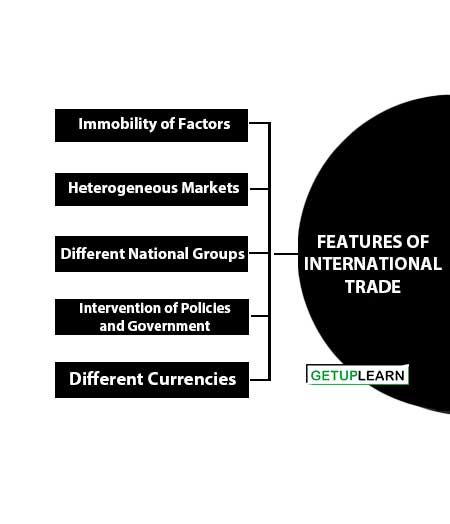Table of Contents
- 1 What is International Trade?
- 2 Features of International Trade
-
3 Importance of International Trade
- 3.1 Division of Labor and Specialization
- 3.2 Optimum Allocation and Utilization of Resources
- 3.3 Brings Reputation and Helps Earn Goodwill
- 3.4 Availability of Multiple Choices
- 3.5 Ensures Quality and Standard Goods
- 3.6 Improves Standard of Living of People
- 3.7 Generate Employment Opportunities
- 3.8 Facilitate Economic Development
- 3.9 Assistance During Natural Calamities
- 3.10 Maintains Balance of Payment Position
- 3.11 Promotes World Peace
- 4 Disadvantages of International Trade
- 5 Advantages of International Trade
- 6 FAQs About the International Trade
What is International Trade?
External trade is also called International Trade. It implies buying and selling of goods or services between two or more countries. For instance, If Mr. A who is a trader from Delhi, sells his goods to Mr. B another trader from China then this is an example of foreign trade or International trade.
International Trade can be further subdivided into the following three groups:
-
Export Trade: When a trader from their home country sells his goods to a trader located in another country, it is called export trade. For e.g., a trader from India sells his goods to a trader located in New York.
-
Import Trade: When a trader in a home country bought goods from a trader located in another country, it is called import trade. For e.g., a trader from India bought goods from a trader located in New York.
- Entrepot Trade: When goods are imported from one country and then after doing some processing re-exported again, it is called entrepot trade. In other words, it can be also called as re-export of processed imported goods. For e.g., a trader from India bought some raw material or spare parts from a trader from Canada, then convert it into finished goods, and then re-export to a trader from New York.
For all practical purposes, trade or exchange of goods and services between two or more countries is called “international” or “foreign” trade. International trade takes place on account of many reasons such as:
- Countries’ resources are not sufficient to satisfy the wants of all people residing in their country. Hence, there tends to be interdependence of one country to another country.
- Factor endowments differ in different countries.
- Technological advancement of different countries differs. Thus, some countries are having better technological production in one type of goods and some others have better technological production in another type of goods.
- Labor and entrepreneurial skills in different countries differ.
- Immobile Factors of production between countries.
In short, international trade is the result of territorial division of labor and specialization in the countries of the world.
Features of International Trade
The following are the various features of international trade:
- Immobility of Factors
- Heterogeneous Markets
- Different National Groups
- Intervention of Policies and Government
- Different Currencies

Immobility of Factors
There is a high degree of immobility of factors like labor and capital between countries. There are Immigration laws, citizenship, qualifications, etc. which restrict the international mobility of labor. Similarly, there are government restrictions on International capital flows.
Due to the difference in labor cost and capital cost, there is an influence on the price and cost of the commodity. There are different prices in different countries for the same commodity.
For instance, the price of tea in India must, in the long run, be equal to its cost of production in India. But in the U.K., the price of Indian tea may be permanently higher than its cost of production in India. In this way, international trade differs from home trade.
Heterogeneous Markets
In the international economy, world markets have differences in climate, language, preferences, habits, customs, weights and measures, etc. Due to such differences, there is a difference in the behavior of international buyers.
Different National Groups
International trade is a phenomenon that occurs between differently cohered groups. The socioeconomic environment differs greatly among different nations.
Intervention of Policies and Government
Different National Policies and Government Intervention: There is a differences in economic and political policies from one country to another. Policies pertaining to trade, commerce, export and import, taxation, etc., are also different from country to country though they are more or less uniform within the country.
Thus, the government through the tariff policy, import quota system, subsidies, and other controls interfere with the objective of normal trade between one country and another.
Different Currencies
Another notable feature of international trade is that it includes the use of different types of currencies. So, each country has its own policy with regard to exchange rates and foreign exchange.
Importance of International Trade
The following points explain the need and importance of international trade to a country:
- Division of Labor and Specialization
- Optimum Allocation and Utilization of Resources
- Brings Reputation and Helps Earn Goodwill
- Availability of Multiple Choices
- Ensures Quality and Standard Goods
- Improves Standard of Living of People
- Generate Employment Opportunities
- Facilitate Economic Development
- Assistance During Natural Calamities
- Maintains Balance of Payment Position
- Promotes World Peace

Division of Labor and Specialization
Foreign trade brings division of labor and specialization at the world level. Some countries are having abundant natural resources and hence they export raw materials and import finished goods from countries that are abundant in skilled manpower. This provides benefits to all the countries and thereby leading to division of labor and specialization.
Optimum Allocation and Utilization of Resources
Due to specialization, unproductive products can be eliminated and wastage of resources avoided. In other words, resources are used only for the production of productive goods. Thus there is the optimum allocation and utilization of resources at the international level due to foreign trade.
Brings Reputation and Helps Earn Goodwill
A country that deals in exports earns goodwill in the international market. For e.g. Japan exports quality electronic goods and hence earns goodwill in the international market.
Availability of Multiple Choices
Since it is difficult for all countries to manufacture all types of goods. Foreign trades make available new varieties to consumers all over the world and provide a better choice to the consumers.
Ensures Quality and Standard Goods
Foreign trade is highly competitive as compared to internal trade. This is so because every firm has to compete not only with the firms of their country but also with the firms of other countries.
With a view to maintain and increase the demand for their goods, the exporting countries have to maintain the quality of goods. Thus foreign trade ensures that only quality and standardized goods are produced.
Improves Standard of Living of People
Imports can improve the standard of living of the people as people can have a choice of better and new varieties of goods and services. Better qualities of goods raise the standard of living of the people.
Generate Employment Opportunities
By increasing the mobility of labor and resources, foreign trade helps in generating employment opportunities. It creates direct employment in the import sector and indirect employment in other sectors of the economy such as the Service Sector industry (insurance, banking, transport, and communication), etc.
Facilitate Economic Development
Imports play an important role in the economic development of a nation. This is because, with the import of capital goods and technology, a country can generate growth in all sectors of the economy, i.e. agriculture, industry, and service sector.
Assistance During Natural Calamities
When a country is affected by natural calamities such as earthquakes, floods, famines, etc., then they have to face the problem of a shortage of essential goods. Foreign trade helps the country to import food grains and medicines from other countries to help the affected people.
Maintains Balance of Payment Position
Maintenance of the balance of payment position is essential for every country. Since, every country has to import, which leads to the outflow of foreign exchange, and export which leads to the inflow of foreign exchange. Balance of payment is the recording of the inflow and outflow of foreign exchange transactions.
Promotes World Peace
Foreign trade brings countries closer. It facilitates the transfer of technology and other assistance from developed countries to developing countries. It brings different countries closer due to economic relations arising out of trade agreements.
Thus, foreign trade creates a friendly atmosphere for avoiding wars and conflicts. It promotes world peace as such countries try to maintain friendly relations among themselves.
Disadvantages of International Trade
Negative effects or disadvantages of international trade for the developing country business:
- Increasing Income Inequalities
- Increasing Domination by Translational Corporations
- Barriers To Protectionist Policies
- Increases Banking and Currency Crisis Risk
- Danger to Environmental Standards
- Loss of Cultural Uniqueness
- Dumping

Increasing Income Inequalities
The growth of international trade is increasing income inequalities among countries. Industrialized nations are generating income from international trade and hence income inequalities are exacerbating between and within industrialized and less industrialized nations.
Increasing Domination by Translational Corporations
Globalization of business is increasingly dominated by transnational corporations which aim to maximize profits without considering the development needs of individual countries or the local populations.
Barriers To Protectionist Policies
Industrialized countries are having their own Protectionist policies which prevent many producers in the Third World from entering export markets. Hence, only industrialized nations are taking advantage of international trade.
Increases Banking and Currency Crisis Risk
With the globalization of trade, both the volume and volatility of capital flows increase. This leads to increases in the risks of banking and currency crises, especially in countries having weak financial institutions.
Danger to Environmental Standards
With the pace of increasing Competition among developing countries to attract foreign investment, developing countries entered into a “race to the bottom” in which countries dangerously lower environmental standards.
Loss of Cultural Uniqueness
In favor of homogenization, Cultural uniqueness is lost and a “universal culture” is coming forth which draws heavily from American culture.
Dumping
Dumping is the practice of selling low-quality goods to advanced countries at low prices in underdeveloped countries. These tactics resorted to by developed countries may harm the development of underdeveloped countries.
Economists who are against international trade often give an example of Latin America where increased openness to international trade had a negative economic effect. Many governments in Latin America (e.g. Peru) liberalized imports far more rapidly than in other regions.
In much of Latin America, import liberalization has been credited with increasing the number of people living below the USD $ 1-a-day poverty line and has perpetuated already existing inequalities (Watkins, 2002).
Advantages of International Trade
The economist who is in favor of international trade explained that international trade creates new opportunities, and new ideas, and opens new markets that an entrepreneur may have not had in their home country. Hence, there are a number of advantages of international trade:
- Create Greater Opportunities for Firms
- More Access to Capital Flows and Human Capital
- Improves Standard of Living
- Facilitate Economic Development

Create Greater Opportunities for Firms
In less industrialized countries, firms have less area of the market and hence international trade allowed them to tap into more and larger markets around the world.
More Access to Capital Flows and Human Capital
With globalization, now countries have more access to capital flows, technology, and human capital. Now they can arrange capital and human capital from the country where it is cheaper.
Improves Standard of Living
Since it is difficult for developing countries to manufacture all types of goods because of the resource constraint. Hence they depend on imports to satisfy the needs of people and people can have a choice of better and new varieties of goods and services. Better qualities of goods raise the standard of living of the people.
Facilitate Economic Development
In developing nations, all sectors of the economy, i.e. agriculture, industry, and service sector are not fully developed. But with the import of capital goods and technology, a country can generate growth in all sectors of the economy, i.e. agriculture, industry, and service sector. Thus, Imports also play a role in the economic development of developing countries.
FAQs About the International Trade
What are the features of international trade?
These are some features of international trade:
1. Immobility of Factors
2. Heterogeneous Markets
3. Different National Groups
4. The intervention of Policies and Government
5. Different Currencies.
What is the importance of international trade?
The importance of international trade are
1. Division of Labor and Specialization
2. Optimum Allocation and Utilization of Resources
3. Brings Reputation and Helps Earn Goodwill
4. Availability of Multiple Choices
5. Ensures Quality and Standard Goods
6. Improves the Standard of Living of People
7. Generate Employment Opportunities
8. Facilitate Economic Development
9. Assistance During Natural Calamities
10. Maintains Balance of Payment Position.
What are the disadvantages of international trade?
The main disadvantages of international trade are:
1. Increasing Income Inequalities
2. Increasing Domination by Translational Corporations
3. Barriers To Protectionist Policies
4. Increases Banking and Currency Crisis Risk
5. Danger to Environmental Standards
6. Loss of Cultural Uniqueness
7. Dumping.
What are the advantages of international trade?
Some of the important advantages of international trade are”
1. Create Greater Opportunities for Firms
2. More Access to Capital Flows and Human Capital
3. Improves Standard of Living
4. Facilitate Economic Development.



